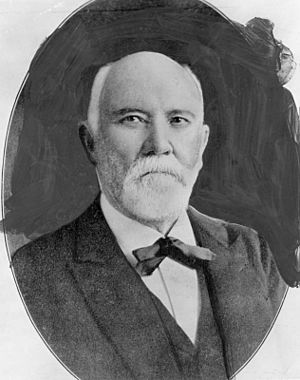Alfred Chapman facts for kids
Quick facts for kids
Alfred Chapman
|
|
|---|---|

Undated portrait
|
|
| Los Angeles City Attorney | |
| In office 1862–1865 |
|
| Preceded by | Myer J. Newmark |
| Succeeded by | James H. Lader |
| Los Angeles County District Attorney | |
| In office 1867–1869 |
|
| Preceded by | Volney E. Howard |
| Succeeded by | Cameron E. Thom |
| Personal details | |
| Born | September 6, 1829 Greensboro, Alabama, U.S. |
| Died | January 16, 1915 (aged 85) San Gabriel Valley, California, U.S. |
Alfred Beck Chapman (born September 6, 1829 – died January 16, 1915) was an important lawyer and investor in Los Angeles, California. He helped start the city of Orange, California. He also served as a city and county attorney.
Contents
Early Life and Education
Alfred Beck Chapman was born in Greensboro, Alabama, on September 6, 1829. His grandfather was a pastor and president of the University of North Carolina at Chapel Hill. His father also attended the University of North Carolina.
Military Service
Alfred Chapman studied at the United States Military Academy at West Point. He graduated in 1854. After graduating, he became a Second Lieutenant in the military.
Serving in the Seminole War
Chapman first served in Florida during the Seminole Wars. He was promoted to Second Lieutenant in the U.S. 3rd Artillery Regiment. Later, he joined the U.S. 1st Dragoon Regiment.
Frontier Duty and Census Work
In 1856, he was sent to Albuquerque, New Mexico. He performed escort duties there. He also served at Fort Buchanan, Arizona. In 1857, he was part of the Gila Expedition. He fought against the Apache people. While at Fort Buchanan, he took the first census for the United States. He counted the Pima, Papago, and Maricopa peoples in Arizona.
California and Resignation
In 1858, Chapman moved to Fort Tejon, California. He was involved in the Mohave War. He scouted against the Mohave people. He was promoted to First Lieutenant in 1859. He then served at Fort Crook and Fort Churchill. He resigned from the military on May 14, 1861. This was after the American Civil War began. He then moved to Los Angeles.
Legal Career and Real Estate
After leaving the military, Chapman began practicing law in Los Angeles in 1862. He studied law with Jonathan R. Scott. He later married Scott's daughter, Mary Scott.
Public Service as Attorney
In 1863, Chapman became the city attorney of Los Angeles. He replaced Myer J. Newmark. In 1868, he was elected district attorney for Los Angeles County.
Law Partnerships and Land Deals
Chapman formed a law partnership with his childhood friend, Andrew Glassell, in 1866. Later, Glassell's brother-in-law, Colonel George H. Smith, joined them. Their law firm focused on real estate. They became wealthy by handling large land division cases. Chapman was the business expert of the firm. He often took land as payment for his legal work. This helped the firm gain more property.
Founding the City of Orange
Chapman and Glassell are well-known in Orange County, California. They helped found the city of Orange, California. In 1867, their firm represented the Yorba and Peralta families. They divided the large Rancho Santiago de Santa Ana land grant. As part of their fees, they received large pieces of land. Chapman and Glassell then developed a new community. They called it Richland, which later became Orange. They hired a surveyor to map out this area.
Other Land Holdings
Chapman and Glassell also handled a major legal case in 1871. It was called "The Great Partition of 1871." This case involved the Rancho San Rafael properties. Again, they received significant land as payment. Chapman also owned much of the land where Glendale, California, and the area of Tropico were later established.
Chapman continued his law practice until 1880. After retiring, he managed his 700-acre (2.8 km2) ranch. This ranch was in the San Gabriel Valley. He focused on growing citrus fruits there.
Family and Later Life
Alfred Chapman had six children with his first wife, Mary Scott. After her death in 1883, he married Mary L. Stephens. They had one child together.
Chapman passed away on January 16, 1915, at age 85. He died at his home in the San Gabriel Valley. His wife and several children survived him.
Legacy
Chapman is sometimes mistakenly thought to be the namesake for Chapman University. However, the university was actually named after businessman Charles C. Chapman.
Chapman Avenue, which runs through the center of Orange, was indeed named to honor Alfred Beck Chapman.
The neighborhood of Chapman Woods in Pasadena is also named after Alfred Chapman. This was the location of his ranch in the San Gabriel Valley.
 | Jessica Watkins |
 | Robert Henry Lawrence Jr. |
 | Mae Jemison |
 | Sian Proctor |
 | Guion Bluford |

